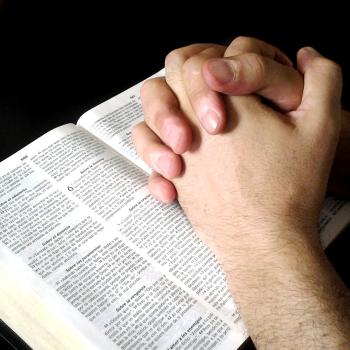One thing that even non-Christians know about Jesus is that He talked about love quite a bit.

Imagevia Pixabay
We are supposed to love people.
But what exactly did Jesus say about loving people?
Here is a brief survey of what He had to say, with some comment:
43“You have heard that it was said, ‘Love your neighbor and hate your enemy.’ 44 But I tell you, love your enemies and pray for those who persecute you, 45 that you may be children of your Father in heaven. He causes his sun to rise on the evil and the good, and sends rain on the righteous and the unrighteous. 46 If you love those who love you, what reward will you get? Are not even the tax collectors doing that? 47 And if you greet only your own people, what are you doing more than others? Do not even pagans do that? 48 Be perfect, therefore, as your heavenly Father is perfect. (Mt 5.43-48)
It’s interesting that the first thing that Jesus has to say about love in the Gospels is about loving your enemy, not about loving your neighbour. It seemed important to Jesus to make this point first! It goes against our natural tendencies and instincts, and it is one of the hardest things that Jesus calls us to. Love does no harm to a neighbour (Rom 13.10), and so our enemy is to receive love from us instead.
34 “Do not suppose that I have come to bring peace to the earth. I did not come to bring peace, but a sword. 35 For I have come to turn
“‘a man against his father,
a daughter against her mother,
a daughter-in-law against her mother-in-law—
36 a man’s enemies will be the members of his own household.’
37 “Anyone who loves their father or mother more than me is not worthy of me; anyone who loves their son or daughter more than me is not worthy of me. (Mt 10.34-37)
We are to love Jesus first and foremost, and we are to set all other human relationships within that context. We love our family, of course, but our devotion to Christ and His ways supersedes even this natural love.
31 “When the Son of Man comes in his glory, and all the angels with him, he will sit on his glorious throne. 32 All the nations will be gathered before him, and he will separate the people one from another as a shepherd separates the sheep from the goats. 33 He will put the sheep on his right and the goats on his left.
34 “Then the King will say to those on his right, ‘Come, you who are blessed by my Father; take your inheritance, the kingdom prepared for you since the creation of the world. 35 For I was hungry and you gave me something to eat, I was thirsty and you gave me something to drink, I was a stranger and you invited me in, 36 I needed clothes and you clothed me, I was sick and you looked after me, I was in prison and you came to visit me.’
37 “Then the righteous will answer him, ‘Lord, when did we see you hungry and feed you, or thirsty and give you something to drink? 38 When did we see you a stranger and invite you in, or needing clothes and clothe you? 39 When did we see you sick or in prison and go to visit you?’
40 “The King will reply, ‘Truly I tell you, whatever you did for one of the least of these brothers and sisters of mine, you did for me.’
41 “Then he will say to those on his left, ‘Depart from me, you who are cursed, into the eternal fire prepared for the devil and his angels. 42 For I was hungry and you gave me nothing to eat, I was thirsty and you gave me nothing to drink, 43 I was a stranger and you did not invite me in, I needed clothes and you did not clothe me, I was sick and in prison and you did not look after me.’
44 “They also will answer, ‘Lord, when did we see you hungry or thirsty or a stranger or needing clothes or sick or in prison, and did not help you?’
45 “He will reply, ‘Truly I tell you, whatever you did not do for one of the least of these, you did not do for me.’
46 “Then they will go away to eternal punishment, but the righteous to eternal life.” (Mt 25.31-46)
This parable does not include the word “love,” but given that the action is all very sacrificial and loving, surely it can be included. We are to love “the least of these,” and give special care to the poor, the sick, the stranger, etc. The ones that do not feel loved, that feel “on the outside,” that need special care – we love them as a priority. If love were not enough of a reason, apparently our Final Judgment will be based at least in part on how well we do this.
28 One of the teachers of the law came and heard them debating. Noticing that Jesus had given them a good answer, he asked him, “Of all the commandments, which is the most important?”
29 “The most important one,” answered Jesus, “is this: ‘Hear, O Israel: The Lord our God, the Lord is one. 30 Love the Lord your God with all your heart and with all your soul and with all your mind and with all your strength.’ 31 The second is this: ‘Love your neighbor as yourself.’ There is no commandment greater than these.”
32 “Well said, teacher,” the man replied. “You are right in saying that God is one and there is no other but him. 33 To love him with all your heart, with all your understanding and with all your strength, and to love your neighbor as yourself is more important than all burnt offerings and sacrifices.”
34 When Jesus saw that he had answered wisely, he said to him, “You are not far from the kingdom of God.” (Mk 12.28-34)
The Greatest Commandment. Love God and love neighbour. This is more important than any other offering that we bring to God.
27 He answered, “‘Love the Lord your God with all your heart and with all your soul and with all your strength and with all your mind’; and, ‘Love your neighbor as yourself.’”
28 “You have answered correctly,” Jesus replied. “Do this and you will live.”
29 But he wanted to justify himself, so he asked Jesus, “And who is my neighbor?”
30 In reply Jesus said: “A man was going down from Jerusalem to Jericho, when he was attacked by robbers. They stripped him of his clothes, beat him and went away, leaving him half dead. 31 A priest happened to be going down the same road, and when he saw the man, he passed by on the other side. 32 So too, a Levite, when he came to the place and saw him, passed by on the other side. 33 But a Samaritan, as he traveled, came where the man was; and when he saw him, he took pity on him. 34 He went to him and bandaged his wounds, pouring on oil and wine. Then he put the man on his own donkey, brought him to an inn and took care of him. 35 The next day he took out two denarii and gave them to the innkeeper. ‘Look after him,’ he said, ‘and when I return, I will reimburse you for any extra expense you may have.’
36 “Which of these three do you think was a neighbor to the man who fell into the hands of robbers?”
37 The expert in the law replied, “The one who had mercy on him.”
Jesus told him, “Go and do likewise.” (Lk 10.27-37)
Perhaps Jesus most well-known parable, tying into His command to “love your enemy,” from Matthew 5. In this story, we are told that our love for neighbour surpasses politics, race, religion, etc. The person “on the other side” is who we are called to love, and this story shows that our love is to have a very practical and sacrificial application; it is not a feeling alone, but an action that we live out.
34 “A new command I give you: Love one another. As I have loved you, so you must love one another. 35 By this everyone will know that you are my disciples, if you love one another.” (Jn 13.34-35)
One of the great “one another’s” of the New Testament. If that person is “another” person, we are to love them, no matter who they are. We have been loved unconditionally by God; we are to love others in the same way. Apparently this will be one of the great witnesses to the world. By the flip side, when we do this poorly, that too will witness something to the world, and likely not the thing we want.
********
If you’ve enjoyed what you read here, you can follow Third Way Christians on Facebook or Instagram, or sign up here to get new columns emailed directly to you! As well, you can track along with Chris’ Sunday morning teaching at Meadow Brook Church’s YouTube page!












